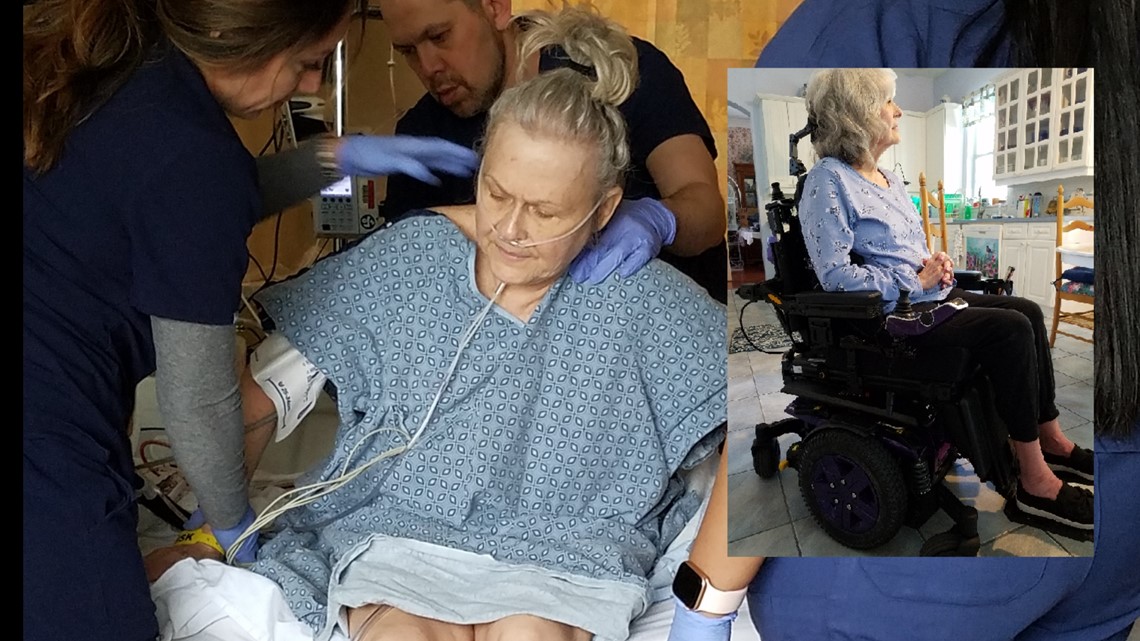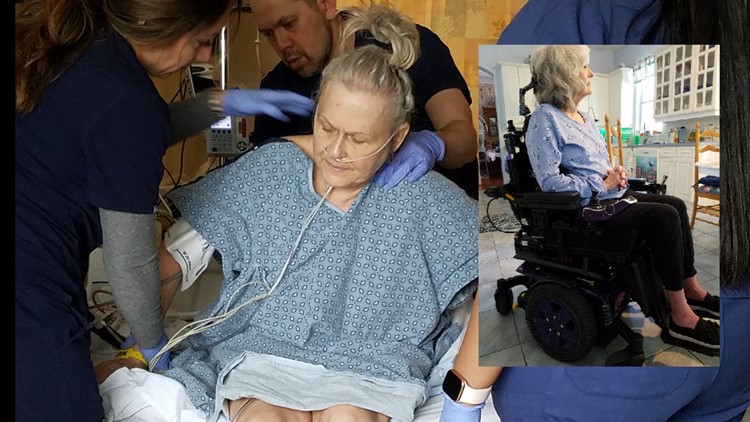A North Texas hospital waited hours to address a spinal emergency. It led to a woman’s paralysis and a $10.1 million court win for her


Texas Health Presbyterian Hospital in Flower Mound was found responsible by a jury for “willful and wanton” negligence in Jessie Adams’ medical malpractice lawsuit.
FLOWER MOUND, Texas — A Dallas County jury awarded a Flower Mound woman and her husband $10.1 million after they took Texas Health Presbyterian Hospital Flower Mound to court following a medical nightmare that left the woman paralyzed from the chest down.
For 73-year-old Jessie Adams, that nightmare began on March 21, 2019.
Adams and her legal team from Lyons and Simmons, LLP, proved to a jury the hospital was responsible for “willful and wanton” negligence that day after failing to timely treat an epidural hematoma.
That failure, per court documents, ultimately left Adams in a wheelchair and changed her life forever.
“I thought I was going to die,” Adams told WFAA. “It was awful. It was hell.”
On March 21, Adams went to Premier Interventional Pain Management in Flower Mound to receive an epidural steroid injection for pain relief, according to her lawsuit.
Adams told WFAA she wanted the injection because she was about to drive to Ohio for a funeral with her husband and was in pain.
But, the procedure didn’t go as planned, Adams said.
“He gave me the shot, but I couldn’t feel my legs. They were tingling, but I couldn’t feel them,” Adams said. “The pain was so bad in my back.”
Per the suit, the doctor who performed the procedure likely, “nicked a blood vessel during the ESI procedure causing Jessie to hemorrhage.”
“Epidural hematoma of the spine creates the extreme risk of spinal cord damage, permanent nerve injury, and paralysis,” the suit reads.
In the suit, Adams’ legal team found that the 73-year-old was observed at the pain treatment facility for about an hour and a half before an ambulance was finally called. The doctor who performed the procedure settled with Adams without going to trial, per her attorneys.
According to arguments made at trial, Adams was rushed to Texas Health Presbyterian Hospital in Flower Mound and was admitted into the ER at 4:54 p.m.
Within ten minutes of arriving at the emergency room, a “STAT” MRI was ordered for Adams so that an emergency laminectomy could be done.
The risk of paralysis is what hospital staff should have been focusing on. However, the suit reads that an MRI didn’t start until 1 hour and 37 minutes later, according to arguments made at trial.
At one point, Adams’ attorneys showed that the person responsible for performing the MRI had even clocked out 23 minutes after an ER nurse acknowledged that the imaging had to be done ASAP.
Per the suit, “there was a delay in either communicating the MRI order or responding to it.”
Surgery didn’t begin on Adams until 10 p.m. that day, per arguments made at trial.
Adams’ attorneys even showed that the orthopedic surgeon who finally operated on the 73-year-old was present when she first arrived.
But, “because they waited, that surgeon was on his way home when finally contacted, and forced to turn around and return to the hospital to respond, creating a further delay.”
Five hours and six minutes passed between when Adams arrived at the hospital and the surgery began.
Per the hospital’s surgical case scheduling policies, which WFAA obtained, emergency surgery is expected to be done within one hour in the first available surgical suite.
Adams’ attorneys proved to a jury that there was a surgical suite available 49 minutes after she arrived at the emergency room.
Her MRI, however, wouldn’t be completed until 48 minutes after that availability.
By the time the laminectomy was finished, too much damage had already been done. Adams is now paralyzed from the chest down, is incontinent and must be helped with everyday tasks like showering and getting dressed.
Adams told WFAA about the moment she realized her life was forever changed.
“I kept screaming, ‘help me.’ The pain was so bad in my back. It was awful waiting. I kept saying, ‘please, let’s go,'” Adams said.
“I thought the paralysis was temporary. But once I realized it was permanent, it was a shock, and it was a huge tremor. The hospital just didn’t do its job. We just felt like they didn’t act quickly enough. If they had, maybe I would have been able to stand or could be using a walker. Maybe, I wouldn’t be incontinent. But, now I’m like this.”
Attorneys for Lyons and Simmons also showed during the trial that the hospital violated several more of its policies in its delay of care.
A spokesperson for Texas Health hasn’t responded to WFAA’s request for comment yet.
At trial, the hospital’s attorneys argued that Adams was paralyzed before she came to the hospital and that there was no delay in care.
The jury, however, didn’t agree.
Adams and her husband Rich were singers, performers and songwriters before this nightmare.
What used to be a life filled with music, is now one constantly focused on helping Adams. Rich had to retire early to care for Adams, too.
“What most people do for themselves, I do for her,” Rich said. “It’s a 24-7 endeavor to make sure that she’s okay.”
“Music was our lifeblood for so many years, and he can’t do it anymore,” Adams said. “He goes upstairs to play his guitar and write, and suddenly I need him to come and cath me. I just feel like I’m going to wake up from this bad dream but it’s the same routine.”
Adams only hopes that patients understand that mistakes might happen, even though they shouldn’t, when they walk into a hospital and are expecting to be taken care of.
She also prays that her win in court resonates amongst the medical community.
“If they did that to me, are they going to do that to somebody else, too?” she said.
Share this news on your Fb,Twitter and Whatsapp
Times News Network:Latest News Headlines
Times News Network||Health||New York||USA News||Technology||World News